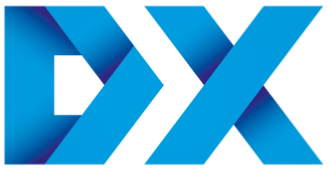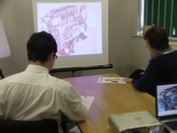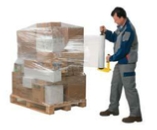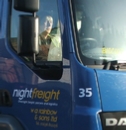Front line ‘ambassadors’
People at the “sharp end” of the business include driving, traffic office, warehouse, sales and customer service staff who have constant contact with customers and the general public either by telephone/fax/email/messaging or directly in person. Drivers have the added exposure to the public in that, when they deliver goods, they are in contact with our customer’s customer. For these reasons attributes such as presentable appearance, courteousness, good manners, helpfulness and effectiveness are vitally important factors taken into account in staff selection and retention.
Driving
Typically, multi-drop drivers are responsible for local deliveries (or drops) at businesses and homes during the first part of each working day, and for collections into the network from businesses during the latter part of the day. Each driver has a round covering an area made up of a group of postcodes. The first part of the journey, the stem journey, takes them to the heart of their delivery location. Routes are planned so that high priority, e.g. before 9-30 am, freight is loaded towards the tail of the vehicle and is delivered or dropped first. The planned route then takes them to lower priority addresses and finally onto the collection part of the round. Typical delivery vehicles are 7.5 tonne chassis cabs with rigid bodies although some have bigger capacities. Over time drivers learn a number of rounds and the most experienced drivers become relief drivers mainly to cover holidays or excessive workloads and help out with training new drivers.
Trunk drivers are responsible for driving and returning articulated tractor-trailer rigs from depot to central sortation hub with the depot’s collected freight. Trunk runs have to be timed according to a schedule or matrix to ensure that unloading bays are available when they arrive. Drivers return with the freight collected from other parts of the country to be delivered by their local depots.
Traffic and operations
Driver activity is controlled by Traffic Office staff through the use of pre-planned round lists, briefing, de-briefing and in-cab communication devices. Traffic office staff ensure that plans take into account the Working Time Directive and European Drivers Hours rules affecting permissible driving and total hours and compulsory rest breaks. They are also responsible for accounting for all freight entering and leaving the depot to ensure that it is correctly routed according to the service level booked by the consignor. A feature of the work is to answer telephone, email, messaging and fax queries from other depots regarding their deliveries into our regions.
Usually based within traffic offices, our data input staff handle consignment bookings and updating the operations system, DXTrack, with details of deliveries made.
Warehouse staff
Various shift patterns apply according to local needs. Using appropriate handling equipment the following cycle of events takes place at least once every 24-hour period:
1. Loading multi-drop vehicles with freight to be delivered to businesses and homes in your depot region
2. Unloading multi-drop vehicles of freight collected from their rounds
3. Loading trailers with freight bound for other depots via the hub(s)
4. Unloading trailers with freight to be loaded onto multi-drop vehicles for delivery as in 1. above
A feature of the network operation is that freight is rapidly moved between one part of the cycle to another so freight handling patterns such as cross-docking and effective labelling are established to efficiently and accurately transfer goods between the vehicles at each stage 1. to 4. as referred to above.
Selected staff are formally trained and certified to operate fork lift trucks and in vehicle shunting within depot yards. Frequently, warehouse staff progress to warehouse management or traffic operations.
Customer Services (Customer Care)
Customer services staff deal with customers and other depots regarding consignments to be delivered into our counties including POD (proof of delivery) requests. On behalf of our customers they also contact other DX depots to progress deliveries of our own customer consignments, they handle pricing and invoicing and are engaged in the company’s claims procedures.
Other depot-based roles
Staffing at depots varies according to local needs. Some sales staff and senior management are based at depots. Depots may have their own cleaning staff or agency services and have workshops and mechanics.
Central roles
Central Rainbow Head Office functions are mainly based at our Newark site in Nottinghamshire. Apart from directors and members of the management board, roles include sales, HR, payroll, purchase ledgers, sales ledgers and a small IT function. The site also houses our main central fleet workshops. The mechanics and other staff in the workshops are mainly involved in commercial vehicle maintenance but in addition they have responsibility for some trailer and van box building and property construction and maintenance.
Equal opportunities
The Group has a record of employing people from a wide variety of backgrounds taking into account their ability to perform the role to the level intended given standard or reasonably modified equipment and the requirements for all employees of a safe, healthy working environment.

 Storage and distribution
Home
Delivery services
Freight specifications
Fuel Surcharge
Storage and distribution
Home
Delivery services
Freight specifications
Fuel Surcharge
 ACCESSIBILITY
ACCESSIBILITY


 Covid-19
Covid-19




